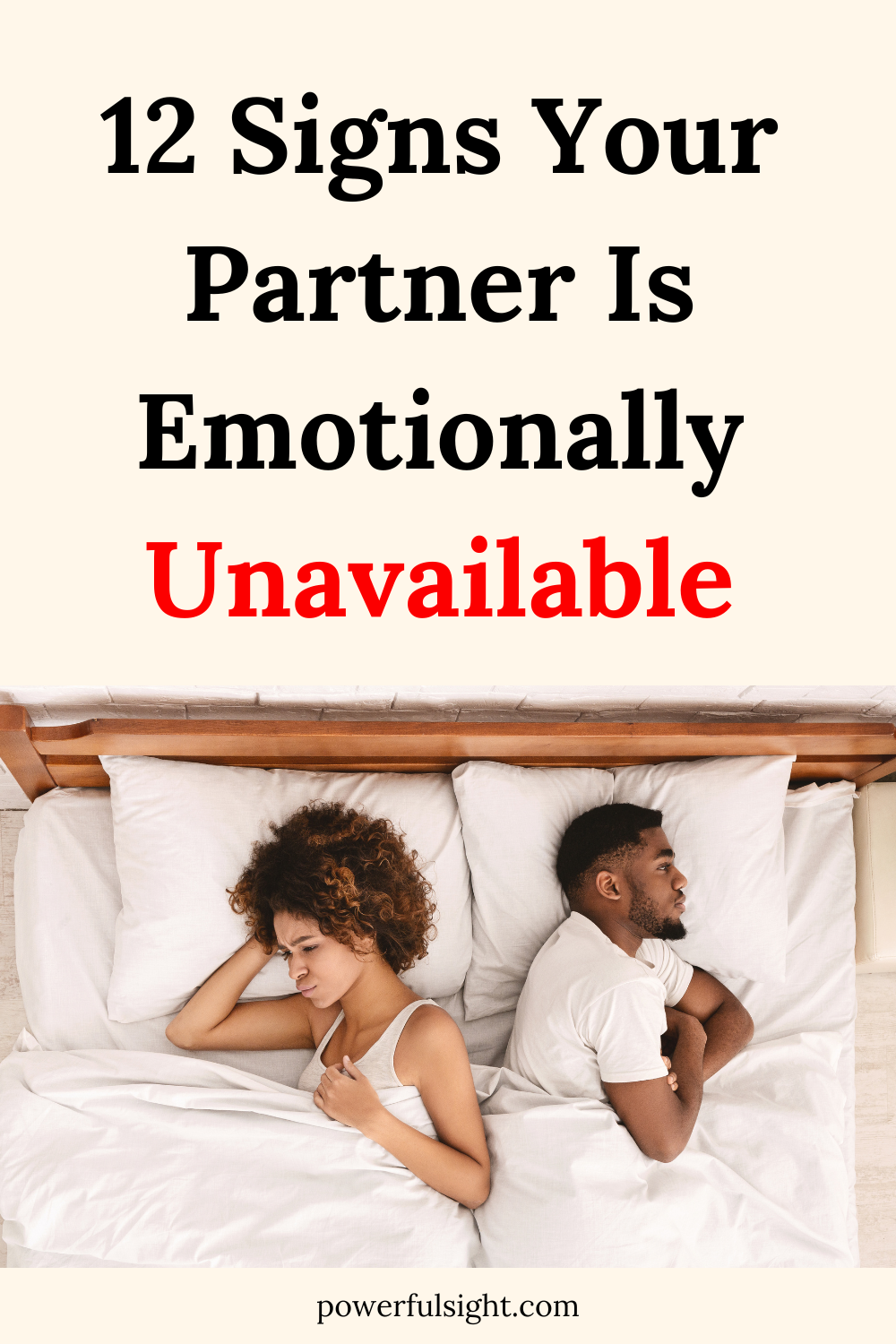Emotional connection is the bedrock of any fulfilling and healthy relationship. It’s what lets you know that you’re seen, heard, and loved in a partnership. But what happens when things don’t feel totally secure between you and your significant other?
It can be confusing. On one hand, they might seem perfect on paper — intelligent, fun, loving, kind — but there’s just something missing. You sense that they’re avoiding going deep, or that they only show up emotionally on their own terms.
If you’re wondering whether your partner is emotionally unavailable, here are signs that can help you figure it out (and know how to respond).
Signs Your Partner Is Emotionally Unavailable
1. They Don’t Share Their Feelings
If you’ve ever tried asking your partner how they feel about something (or how they’re feeling in general) and they respond with a shrug or a simple “I’m fine,” they might be emotionally unavailable.
Emotionally unavailable partners often struggle or seem indifferent when it comes to talking about their feelings. They might not know how to explain what they’re feeling, or they may simply not be used to discussing emotions at all.
You may also notice that when you start talking about deep or meaningful topics, they seem uncomfortable or even avoid eye contact. They may have a tough time opening up and expressing their emotions — even if they care about you.
In the long run, this lack of emotional sharing and processing can make you feel unseen or unimportant in the relationship.
Related: 10 Ways to Not Let Your Emotions Control You

2. They Keep You at a Distance
If you feel like you’re always playing catch-up or never getting a real sense of who your partner is, that’s a big sign of emotional unavailability.
Emotionally unavailable people often maintain a certain level of distance, even in relationships. They may be vague about their feelings, past, or personal life. You might technically have a partner but still not really know them.
You may find that you can talk about many topics, but there’s one area of conversation they always avoid: anything that could lead to real emotional closeness.
This can be frustrating, especially if you’re ready to share your life with someone while they’re not.
Related: 15 Ways to Deal with Difficult Emotions
3. They Don’t Want to Have Deep or Serious Conversations
Healthy relationships require deep and meaningful conversations about values, goals, fears, and emotional needs. Emotionally unavailable people tend to avoid these kinds of discussions.
If you bring up a serious issue — like relationship goals, feelings, or problems — they might joke about it, tell you not to overthink, or quickly move the conversation in a different direction.
An emotionally unavailable partner may also become silent, change the subject, or even get defensive when the relationship starts to feel “too real.”
Related: Stages of Emotional Intimacy in a Healthy Relationship
4. They’re Not Comfortable with Vulnerability
Emotionally unavailable partners are often not used to being vulnerable. This means they may be uncomfortable expressing emotions, opening up about past hurts, or being in a relationship where they’re not in control.
They may be afraid of being hurt or rejected, so they keep their distance. If you start to feel really close to your partner, they might push you away or create emotional space between you.
Related: When You Feel No Emotional Connection with Your Husband
5. They Send Mixed Signals
Does your partner say one thing but do another? Is the honeymoon phase followed by a cold shoulder — then another warm phase, then another cold shoulder, and so on? Welcome to the world of mixed signals.
Mixed signals can be frustrating because they keep you in limbo, unsure of where you stand. This inconsistency usually means they’re internally conflicted. They want connection but are scared of it, so they keep you at a distance.
Related: How To Control Your Emotions In A Relationship
6. They Avoid Commitment or Defining the Relationship
Emotionally unavailable people often avoid setting boundaries, making plans, or discussing the future.
You might find that your partner never wants to make concrete plans or talk about the relationship. They’ll say things like:
-
“It’s still early.”
-
“We’re just going with the flow.”
-
“It doesn’t matter if we label it.”
They may still enjoy your company, time, and connection when they’re around — it’s not that they don’t like you, it’s that they don’t want to feel bound or tied down.
If you mention commitment and they react by pulling away, that’s a major warning sign of emotional unavailability.
7. They Prioritize Independence — Way Too Much
It’s healthy to be independent and self-sufficient, but when it becomes excessive, it can be a sign of emotional unavailability.
Does your partner never ask for help or advice? Do they avoid sharing their struggles? Do they seem to prefer handling everything alone? An emotionally unavailable person might view needing help or depending on someone as a weakness — in themselves or others.
If your partner seems to pride themselves on not needing you or never asking for support, that’s a problem. You can’t build a healthy partnership if one person refuses to lean on the other. Relationships require mutual support — it takes two to tango.
8. They Lack Empathy
An emotionally available person can empathize with you when you’re upset, scared, or hurt. An emotionally unavailable partner, on the other hand, might get frustrated, downplay your feelings, or not know how to respond when you’re struggling.
They might even become visibly uncomfortable when you’re sad or crying. This doesn’t mean they don’t care — it may simply mean they’ve never learned how to respond appropriately or can’t tolerate strong emotions.
If your partner seems uneasy when you’re not “okay,” it’s important to recognize that emotional support is not their strength.
9. They Focus on the Physical Side of the Relationship
Physical connection is only one part of a relationship. But when your partner only shows up physically and avoids emotional intimacy, that’s a sign of emotional unavailability.
Emotionally unavailable people might express love or affection through physical touch, but when you try to talk about feelings, they shut down or change the subject. In these cases, your partner may use physical affection to avoid emotional closeness.
Over time, the relationship can start to feel empty. You might connect in bed or share physical affection, but never achieve the emotional depth that truly bonds two people.
10. They Have a History of Short-Lived or Shallow Relationships
Is your partner’s relationship history filled with brief flings or vague “almost” relationships? Do they say things like “I get bored easily” or “I just haven’t met the right person”? This may indicate emotional unavailability.
Emotionally unavailable people often end relationships once they become serious or emotionally intimate. This doesn’t necessarily mean they don’t care about their partners — it means they find deep emotional connection uncomfortable.
They may also have a pattern of dating other emotionally unavailable people, which reinforces their own avoidance of intimacy.
If you look closely at their relationship history, you might see a trail of short-lived connections and emotional inconsistency — both warning signs of emotional unavailability.
11. You’re Always the One Making the Effort
Are you always the one initiating conversations, planning dates, or saying “I love you” first? That could be another sign your partner is emotionally unavailable.
If they only make an effort or show affection on their terms, it often means they’re emotionally available only when it’s convenient for them.
Healthy relationships require consistent effort and emotional reciprocity from both people. When you find yourself doing 90% of the work, it’s a strong sign your partner’s emotional distance isn’t about busyness — it’s about unavailability.
12. You Always Feel Lonely in the Relationship
Perhaps the most painful and disheartening sign: you feel alone, even when you’re together.
There’s a lack of emotional depth in your partnership. They go through the motions of being together, but there’s no true connection. When you need support or comfort, it often goes unresolved or ignored. You may feel like you’re talking to a brick wall.
Even when you’re physically together, they might not engage emotionally or show interest in your inner world. Being with an emotionally unavailable partner often feels like being connected in some ways but completely alone in others.
Why People Become Emotionally Unavailable
Emotional unavailability usually stems from past experiences or long-held patterns. A person may have grown up in a family that didn’t show or discuss emotions, or they may have been hurt or rejected by past partners.
Sometimes, emotionally unavailable people are simply afraid of rejection or of being hurt again, so they build emotional walls. They may not want to feel vulnerable, which is why they shut down when things start to get serious.
There are many reasons people become emotionally unavailable. Once you understand why they are the way they are, it can help you decide whether they’re worth waiting for — or whether it’s time to move on.
Can an Emotionally Unavailable Partner Change?
Yes, they can — but only if they truly want to.
Becoming emotionally available requires inner work, therapy, self-reflection, and a willingness to change thoughts, behaviors, and patterns. It’s possible, but only if they’re committed to the process.
You can’t make someone become emotionally available. You can express your needs, set boundaries, and communicate your desires clearly — but you can’t change them.
If you’re always the one doing the emotional labor, it may be time to ask yourself whether you’re waiting for potential or accepting the reality of who they are.
What You Can Do
Communicate your needs honestly.
Explain to your partner how their emotional distance makes you feel — confused, lonely, disrespected — but avoid blaming or shaming them. Use “I” statements, like: “I feel left out when we don’t talk about our problems.”
Set your boundaries.
Don’t overextend yourself or settle for emotional unavailability. Protect your own emotional health and needs.
Don’t take it personally.
Your partner’s behavior usually reflects their past experiences more than your worth as a person.
Encourage them to get help.
Therapy can be a great space for both of you to heal from past wounds and learn healthier emotional habits.
Know when to walk away.
If you’ve tried and nothing has changed, it’s okay to choose yourself. Sometimes people can change — but it’s not your job to make them.
Final Thoughts
Emotionally unavailable partners can be complex and confusing. You might see glimpses of the loving, present partner you wish they could be — and that’s what keeps you holding on.
It’s hard to give up on love when you see potential. But sometimes love means giving yourself the gift of emotional availability instead of waiting for your partner to find theirs.
You deserve a relationship where you are seen, heard, and loved — not one where you’re waiting for someone to meet you halfway.
Save pin for later.

- 9 Things Daughters Of Narcissistic Mothers Don’t Do - 02/03/2026
- Daughters of Narcissistic Mothers Healing Affirmations - 27/02/2026
- 5 Perfect Mother’s Day Gift Ideas (That She’ll Truly Love) - 27/02/2026
